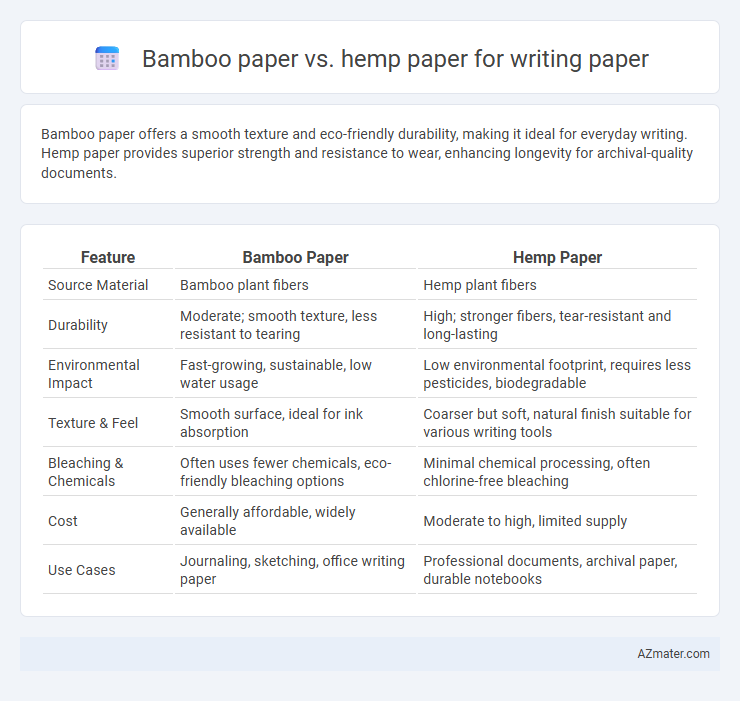Bamboo paper offers a smooth texture and eco-friendly durability, making it ideal for everyday writing. Hemp paper provides superior strength and resistance to wear, enhancing longevity for archival-quality documents.
Table of Comparison
| Feature | Bamboo Paper | Hemp Paper |
|---|---|---|
| Source Material | Bamboo plant fibers | Hemp plant fibers |
| Durability | Moderate; smooth texture, less resistant to tearing | High; stronger fibers, tear-resistant and long-lasting |
| Environmental Impact | Fast-growing, sustainable, low water usage | Low environmental footprint, requires less pesticides, biodegradable |
| Texture & Feel | Smooth surface, ideal for ink absorption | Coarser but soft, natural finish suitable for various writing tools |
| Bleaching & Chemicals | Often uses fewer chemicals, eco-friendly bleaching options | Minimal chemical processing, often chlorine-free bleaching |
| Cost | Generally affordable, widely available | Moderate to high, limited supply |
| Use Cases | Journaling, sketching, office writing paper | Professional documents, archival paper, durable notebooks |
Introduction to Bamboo and Hemp Paper
Bamboo paper, made from fast-growing bamboo fibers, offers durability and sustainability due to bamboo's rapid regeneration and minimal pesticide use. Hemp paper, derived from the strong cellulose fibers of the hemp plant, is prized for its high tensile strength and resistance to aging, making it ideal for archival writing. Both papers provide eco-friendly alternatives to traditional wood-based paper, with bamboo known for softness and smoothness, while hemp excels in longevity and environmental impact.
Sustainability and Environmental Impact
Bamboo paper offers a highly sustainable option due to bamboo's rapid growth rate and minimal need for pesticides, making it carbon-negative and reducing deforestation compared to traditional wood paper. Hemp paper, derived from the hemp plant, is also environmentally friendly, boasting a high yield per acre, requiring less water, and regenerating soil health, which contributes to lower environmental degradation. Both papers surpass conventional wood-based papers in biodegradability and recyclability, but hemp paper's durability and lower chemical processing further enhance its eco-friendly profile.
Raw Material Sources and Cultivation
Bamboo paper is derived from fast-growing bamboo plants, which regenerate quickly and require minimal pesticides or fertilizers, making them a highly sustainable raw material. Hemp paper comes from the fibers of the hemp plant, known for its rapid growth cycle of about 3-4 months, low water needs, and ability to improve soil health through phytoremediation. Both raw materials offer eco-friendly alternatives to traditional wood pulp, but bamboo's dense stalks provide a higher fiber yield per hectare, while hemp's robust stalks produce stronger, more durable paper fibers.
Manufacturing Processes Compared
Bamboo paper production involves rapid harvesting and mechanical pulping that reduces chemical use, resulting in eco-friendly and durable writing sheets. Hemp paper manufacturing requires fiber retting, followed by mechanical or chemical pulping, yielding strong and long-lasting paper with a high cellulose content. Both processes emphasize sustainability, but bamboo offers quicker regeneration and lower environmental impact compared to the more labor-intensive hemp pulping.
Quality and Texture Differences
Bamboo paper features a smooth, durable texture with a fine grain, offering excellent ink absorption and minimal bleed-through, making it ideal for high-quality writing and calligraphy. Hemp paper, on the other hand, has a coarser surface with a robust fiber structure, providing a textured feel that is more resistant to tearing and aging, favored for archival documents. Both papers offer eco-friendly alternatives, but bamboo excels in smoothness and detail precision, while hemp stands out for strength and longevity.
Writing Experience: Smoothness and Ink Absorption
Bamboo paper offers a smooth writing surface with moderate ink absorption, allowing for crisp, clear lines without excessive bleed-through, making it ideal for fountain pens and gel inks. Hemp paper provides a slightly textured feel, enhancing grip and control while its superior ink absorption minimizes smudging and feathering, suitable for various pen types. Both papers deliver quality writing experiences, but bamboo excels in smoothness, whereas hemp prioritizes ink absorption and durability.
Durability and Longevity
Bamboo paper offers remarkable durability due to its strong fiber composition, making it resistant to tearing and suitable for long-term writing projects. Hemp paper surpasses many traditional papers with its exceptional longevity and resistance to yellowing, thanks to its high cellulose content and natural lignin reduction process. Both bamboo and hemp papers provide sustainable, eco-friendly options, but hemp paper is often preferred for archival purposes due to its superior archival quality and durability over decades.
Cost Effectiveness
Bamboo paper typically offers greater cost-effectiveness compared to hemp paper due to faster growth rates and more efficient production processes, resulting in lower raw material costs. Hemp paper, while durable and eco-friendly, generally incurs higher expenses because of intensive harvesting and processing requirements. Choosing bamboo paper for writing purposes can significantly reduce material costs without sacrificing quality or sustainability.
Applications in Stationery and Publishing
Bamboo paper offers a smooth texture and durability ideal for high-quality notebooks and journals in stationery, promoting eco-friendly appeal with rapid renewability. Hemp paper, characterized by its strength and resistance to wear, excels in archival materials and premium publishing where longevity and sustainability are critical. Both papers serve niche markets prioritizing environmental impact, but bamboo suits everyday writing applications while hemp targets specialized or durable document production.
Consumer Preferences and Market Trends
Bamboo paper offers eco-friendly advantages and durable texture, appealing to environmentally conscious consumers seeking sustainable writing solutions. Hemp paper provides a smoother finish with higher fiber strength, favored by artists and premium stationery markets prioritizing quality and longevity. Market trends indicate rising demand for both, driven by increasing awareness of renewable resources and a shift away from traditional wood pulp paper.

Infographic: Bamboo paper vs Hemp paper for Writing paper
 azmater.com
azmater.com